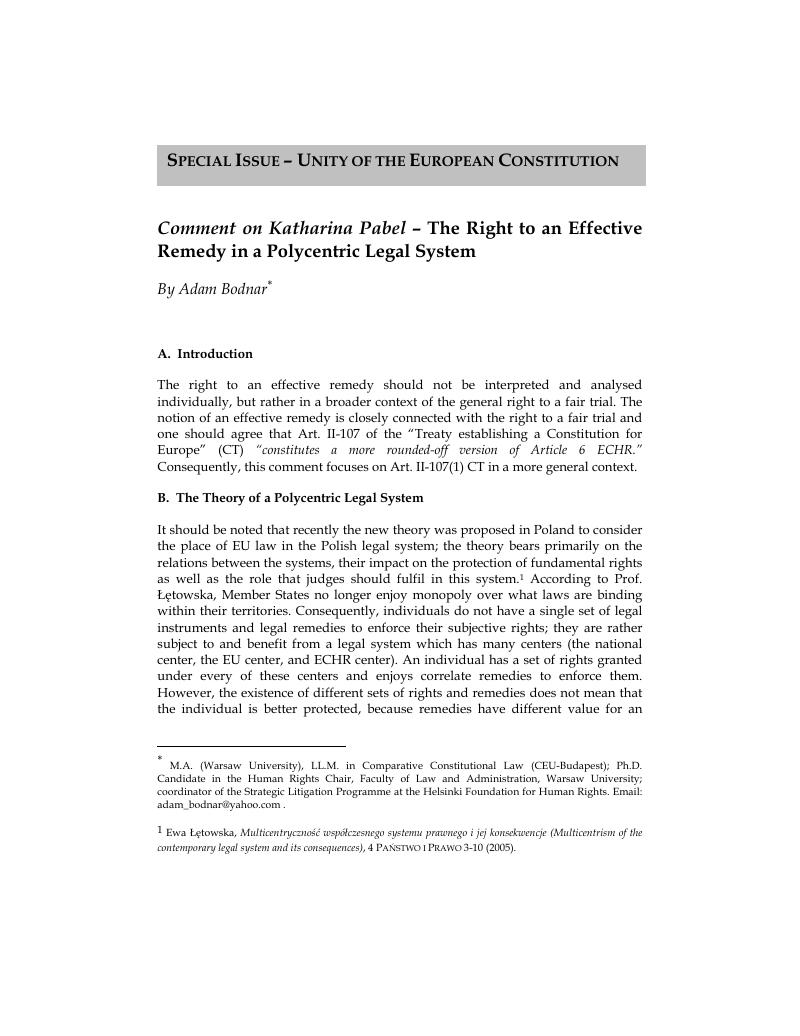Article contents
Comment on Katharina Pabel – The Right to an Effective Remedy in a Polycentric Legal System
Published online by Cambridge University Press: 06 March 2019
Abstract

- Type
- Part II: Institutional Aspects of the Constitution - Towards a New Institutional Balance?
- Information
- German Law Journal , Volume 6 , Issue 11: The Unity of the European Constitution: 2nd German-Polish Seminar on the Constitutional Law of the European Union , 01 November 2005 , pp. 1617 - 1621
- Copyright
- Copyright © 2005 by German Law Journal GbR
References
1 Ewa Łętowska, Multicentryczność współczesnego systemu prawnego i jej konsekwencje (Multicentrism of the contemporary legal system and its consequences), 4 Państwo i Prawo 3-10 (2005).Google Scholar
2 See Pabel, in this volume.Google Scholar
3 Eeckhout, Piet, The EU Charter of Fundamental Rights and the Federal Question, 39 Common Mkt. L. Rev. 945, 946 (2002).Google Scholar
4 See the judgment of the District Court in Lubartów, Poland, Case IC 260/03, (2004) (Where the court applied the EU customs classification to analyze the issues related to the liability for damages. This was an example of the courage of Polish courts in using the Community law, but unfortunately, this use was grossly flawed). See also Ewa Łętowska, Między Scyllą a Charybdą czyli polski sędzia między Strasburgiem I Luksemburgiem (Between Scylla and Charybda – the Polish judge between Strasbourg and Luxembourg), paper presented at the Council of Europe Information Office Conference, Nov. 2005.Google Scholar
5 See the judgment of the Supreme Court on the “golden share,” Case IV CK 713/03, (2004). On this decision for Sept. 30, 2004, the court referred to jurisprudence of the ECJ in this area, but could not apply and interpret the principles stemming from this judgment.Google Scholar
6 See Szpunar, Maciej, Wpływ członkostwa Polski w Unii Europejskiej na sądownictwo – zagadnienia wybrane (The Impact of the Poland's membership in the EU on the judiciary – selected issues], in Przystąpienie Polski do Unii Europejskiej. Traktat Akcesyjny i jego skutki (Accession of Poland to the EU. The Accession Treaty and its Consequences) 277-302 (Biernat et al. eds., 2003). See also Aleksandra Wentkowska, Sądownictwo polskie w przeddzień przystąpienia do Unii Europejskiej – uwagi de lege ferenda (The Polish judiciary before Poland's accession to the EU), in Przystapienie Polski Do Unii Europejskiej. Traktat Akcesyjny I Jego Skutki, 277-302 (Biernat et al. eds., 2003).Google Scholar
7 See Agnieszka Frąckowiak, Wpływ członkostwa Polski w Unii Europejskiej na sądownictwo polskie – spojrzenie ze strony praktycznej (Impact of Poland's membership in the EU on the Polish judiciary – a practical view), in Przystapienie, supra, note 6.Google Scholar
8 Case C-224/01, Köbler v. Austria, 2003 E.C.R. I-10239.Google Scholar
9 Kudła v. Poland, App. No. 30210/96, 2000-XII Eur. Ct. H.R. 512 (2000).Google Scholar
10 Act of June 17, 2004 on the complaint of a party to proceedings on their right to determine a case in court proceedings within reasonable time (Journal of Laws of 2004, No. 179, item 1843).Google Scholar
11 The Polish government has prepared a draft law of March 7, 2005 on the access to free legal aid granted by the state to individuals. It is interesting to note that the grounds for this law refer to the Polish obligations stemming from Art. 6 ECHR and Art. 47 para. 1 of the Charter of Fundamental Rights.Google Scholar
12 See Łukasz Bojarski, Access to Legal Aid in Poland – Monitoring Report, Helsinki Found. Hum. Rts. (2003).Google Scholar
- 1
- Cited by


